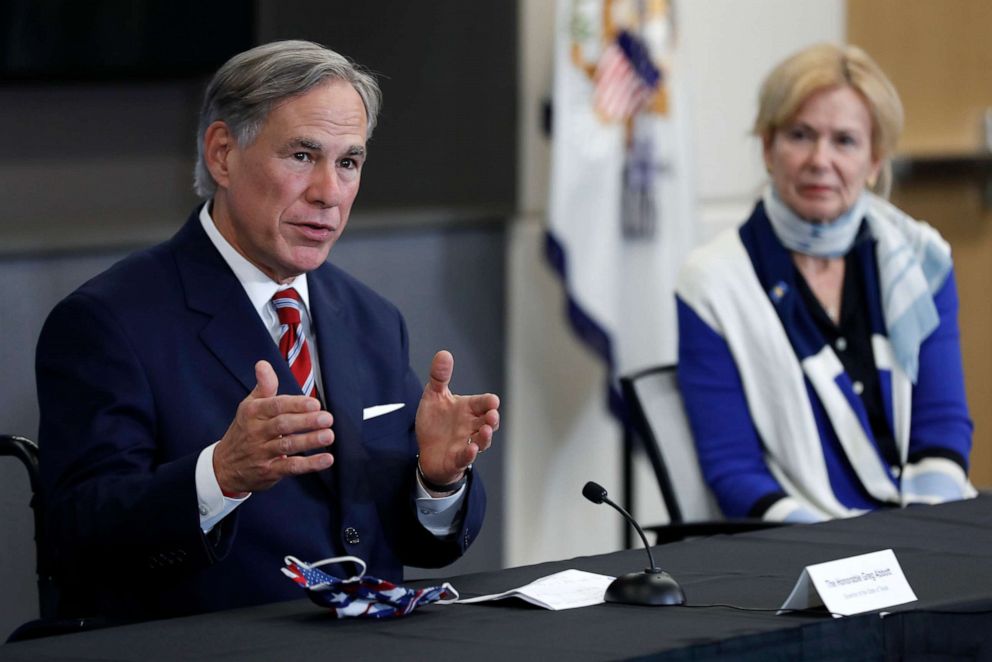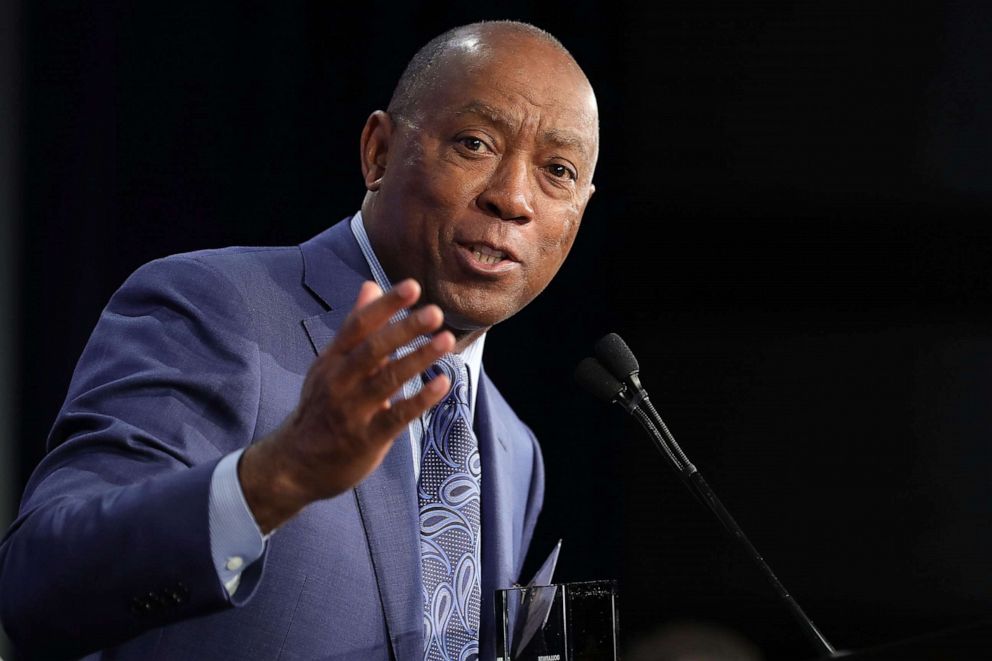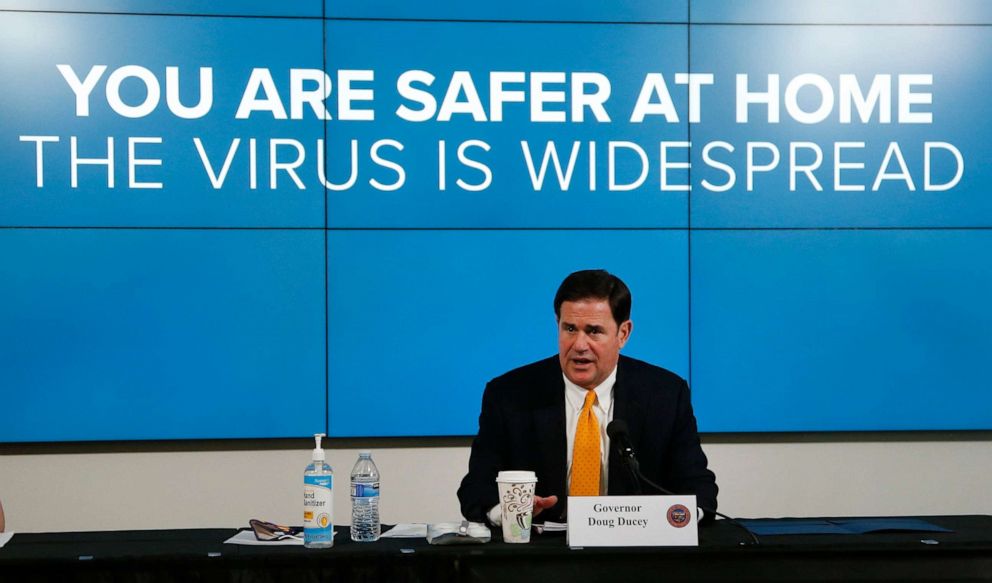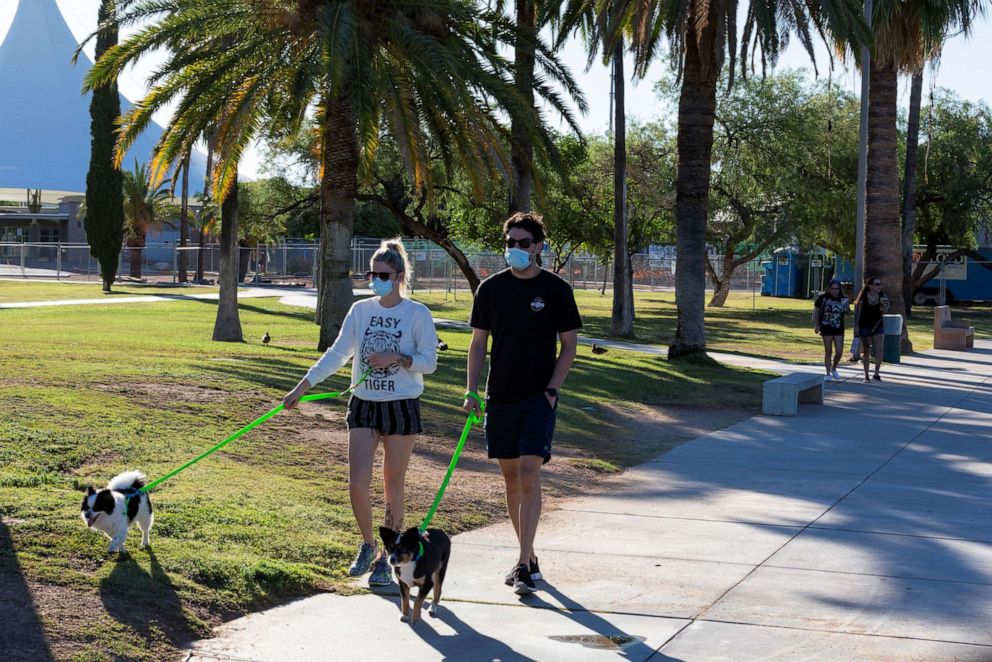Local officials frustrated as governors change rhetoric and send mixed messages on coronavirus
Mixed messaging about the coronavirus has contributed to a rise in cases.
On June 11, a month and a half into reopening efforts in Texas, Houston Mayor Sylvester Turner issued a dire warning.
"The virus is not under control, the community spread is not under control," he said, as the city reported 210 new coronavirus cases. "We no longer have the ability to hit the brakes. That's controlled now totally by the state."
Weeks later, Texas is routinely setting single-day records for the number of new coronavirus cases, and the Houston region is hitting new a high in hospitalizations.
In Texas and other states seeing a coronavirus resurgence, local leaders expressed frustration that inflexible state-level reopening and health guidelines have led to mixed messaging about the coronavirus that has contributed to a rise in cases -- a trend threatening to overwhelm some communities and hospitals in the coming weeks.
"There have been a lot of inconsistent or conflicting messages that have happened," Dr. Umair Shah, the executive director of the Harris County Public Health Department in Texas, recently told ABC News.

In many of Texas' largest cities, local officials have directed their ire at Gov. Greg Abbott, a Republican who began reopening the state on May 1 by permitting some businesses, including restaurants and movie theaters, to open under certain restrictions.
As coronavirus cases increased in the state, Abbott did little to pause or reassess the reopening efforts, and challenged local efforts to take tougher steps to limit outbreaks, including face mask requirements.
"We strongly recommend that everyone wear a mask. However, it's not a mandate," Abbott said at a press conference on April 27 announcing the state's reopening plans. "We make clear that no jurisdiction can impose any type of penalty or fine.
Again in early June, he issued an executive order explicitly banning local governments from imposing civil or criminal penalties for failing to wear a mask.
That frustrated local officials in some of the state's largest cities, who attempted to implement mask mandates with potential fines to encourage compliance.
San Antonio Metro Health's Deputy Director Jennifer Herriott told ABC News that Abbott's resistance to local face covering requirements had a "negative impact" on the city's effort to slow down the spread of the virus, and downplayed the importance of mask-wearing.
"We would have preferred to have stayed with that clear recommendation that people wear (masks) all the time," she said.

It was only last week, as new coronavirus cases jumped to record levels in several regions, that Abbott slowed reopening plans, restricting outdoor gatherings of more than 100 people, ordering a pause on elective surgeries in several large counties, and closing bars across Texas.
"If I could go back and redo anything, it probably would have been to slow down the reopening of bars," Abbott told ABC affiliate KVIA on Friday.
He also gave a nod of approval as several local governments, including Harris County, Dallas County and Bexar County, moved to circumvent the state's ban on fining individuals for not wearing masks by imposing fines instead on businesses that fail to require their staff and customers from wearing masks, saying those modified local mandates are now in compliance with the state order.
Renée Cross, the senior director of the Hobby School of Public Affairs at the University of Houston, said Abbott's resistance to policy-making in Democrat-led cities isn't new, citing his opposition to local bans on fracking and plastic bags in recent years.
But she also noted that he has faced resistance from conservatives over some of his stay-at-home mandates, including pushback from local leaders in Montgomery County, to the north of Houston, over the pace of the May reopening plans.
"He certainly has a thankless job right now," Cross said. "On the one hand, Democrats say he's not doing enough, but then on the other hand, people in his own party are protesting, saying that, even by suggesting we all wear a mask at this point, they feel that is taking away their individual liberties."
Abbott isn't the only governor managing a surging coronavirus outbreak amid pressure from local health officials.

In Arizona, where the number of new coronavirus cases hit a one-day high of 3,857 on Sunday, and the coronavirus cases have risen more than 250% this month, Gov. Doug Ducey, a Republican, faced similar criticism in May and June for resisting calls from local leaders to allow them to implement mask mandates.
It was only as cases began increasing two weeks ago that Ducey allowed cities and counties to design their own mask-wearing rules, following a public pressure campaign from mayors and other local officials across the state.
On Monday, he took further action to delay the start of the school year, and announced an executive order "pausing" the reopening of bars, gyms, water parks and movie theaters.
Arturo Garino, the mayor of Nogales, Arizona, said he was initially against face masks and other safety measures because of their impact on the economy, but reversed course and began pressuring Ducey to allow local rule changes as the number of cases in his border city grew.
In California, where Gov. Gavin Newsom, a Democrat, won praise from public health experts for his early and decisive actions to enforce the stay-at-home orders and contain the spread of the coronavirus, cases are beginning to increase once again -- a phenomenon some public health officials have attributed to relaxed social distancing behaviors and a lack of enforcement of health orders by some businesses.
Dr. Michael Osterholm, a leading epidemiologist at the University of Minnesota, said that local efforts to communicate and implement health guidelines and protocols have also been undercut by the lack of a clear national strategy and plan to respond to the growing outbreaks in many regions of the country.
"We almost have 50 different countries out there right now pursuing their public health approach to containing this pandemic, and that has created tremendous confusion," he said.
For several weeks, the Trump administration has pushed the message that the country and economy is reopening for business after stay-at-home orders. President Donald Trump himself has held several crowded indoor events in areas seeing an increase in new coronavirus cases, undercutting the warnings and guidance from local health officials. Both events, a Trump campaign rally and a Students for Trump event at a Phoenix megachurch, did not require masks or social distancing.

On Friday, Vice President Mike Pence led the White House coronavirus task force's first public press event in two months, where he falsely claimed that the United States had "flattened the curve" of new coronavirus cases, even as the seven-day average of new cases increased over the last several weeks.
"As we stand here today, all 50 states and territories across this country are opening up safely and responsibly," Pence said, even though Texas, Florida and several other states have dialed back or reversed reopening plans.
Dr. Vish Viswanath, a professor of health communications at the Harvard T.H. Chan School of Public Health, said that while disputes between local, regional and federal officials over public health measures and the state of the outbreak are playing out in other countries, the debate in the United States is much more politicized.
"It has moved from a public health issue to a politician issue," he said, pointing to the actions of Trump, Pence and some governors to encourage reopening amid concerns about the coronavirus from local officials and public health experts. "That's what we are hearing -- life versus livelihood, as if they're opposed to each other, and we have to pick one or the other. And that has created this problem, where we are today."
What to know about the coronavirus:
- How it started and how to protect yourself: Coronavirus explained
- What to do if you have symptoms: Coronavirus symptoms
- Tracking the spread in the U.S. and worldwide: Coronavirus map
Tune into ABC at 1 p.m. ET and ABC News Live at 4 p.m. ET every weekday for special coverage of the novel coronavirus with the full ABC News team, including the latest news, context and analysis.




